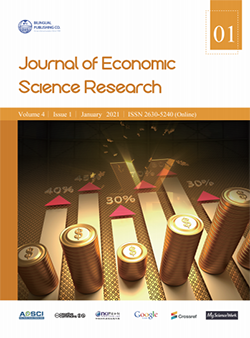The Relationship between Public Service Efficiency of Government and Residential Political Trust in Hong Kong
DOI:
https://doi.org/10.30564/jesr.v4i1.2626Abstract
Hong Kong has a long history with its high efficiency and clean and self-disciplined government. Within the past over 20 years, different social development trend has occurred in Hong Kong. The article observed the relationship between political trust from residence and public service efficiency of government in Hong Kong from 1992 to 2015 and found that the value of public service efficiency has a significant effect on political trust in Hong Kong government, the higher the efficiency of public services, the higher the political trust. The author tried to find the path for the Hong Kong government to improve its public service quality and efficiency after testifying the positive correlation between public service efficiency and residential political trust with empirical analysis.
Keywords:
Hong Kong government; Public service efficiency; Political trustReferences
[1] Kenneth Newton. Trust, social capital, civil society and democracy. International Political Science Review, 2001, 22(2): 201-214.
[2] Guoqing Li, Yuqiang Zhang. Political trust construction in the perspective of public policy. The Tribune of Theory, 2016, 11: 48-58.
[3] Siming Fu. A political system dominated by administration in Hong Kong. China Democratic Legal Press, 2010: 128.
[4] Chiping Yuan. The research of Hong Kong government behavior. Peking University Press, 2008: 116.
[5] Wei Lv, Weitong Wang. Unbalanced development, public services and government responsibilities: Analysis of opportunity government preference and government efficiency. China Social Sciences, 2008, 4: 55-69.
[6] Douglas Morgan. The trust and efficiency paradigm for measuring government performance. Journal of Public Administration, 2013, 4: 111-122.
[7] Wenhong Zhang, Dan Ma. Socio-economic status, democratic ideas and political trust - take Shanghai as an example. Journal of Jiangsu Institute of Administration, 2015, 1: 25-38.
[8] Jianjun Zheng. Relationship between political trust, social justice and political participation - an empirical analysis based on 625 Chinese subjects. Journal of Political Studies, 2013, 6: 48-59.
[9] Tianguang Meng, Ming Yang. Objective governance performance and political trust of county-level government in transitional China – from legitimacy of economic growth to legitimacy of public product. Journal of Beijing Institute of Administration, 2014, 6: 66-80.
[10] Yanxia Li. What kind of governance boosts political trust? - an empirical analysis with the contemporary Chinese public as a sample. Chinese Administration Management, 2015, 7: 105-117.
[11] De Li, Huang Ying. Experience and reference: Hong Kong government public service reform to our mainland enlightenment. Tansuo, 2011, 4: 34-47.
[12] Baofu Xie. A balance between fairness and efficiency - an analysis of the operational mechanism of Hong Kong’s affordable housing policy. Academic Frontier, 2017, 5: 88-99.
[13] Hauptmeier, S, J, Rincke. Fiscal Competition Over Taxes and Public Outputs: Theory and Evidence. Regional Science and Urban Economics, 42(3): 407- 419.
[14] Dan Ma, Hao Yuan. Political trust, democratic ideas and political performance of urban residents - a causal model analysis of an opportunity society. Sociology, 2011, 4: 28-38.
[15] Ying Xia, Bing Guan. Evolution of Hong Kong’s political culture: path, trend and enlightenment. Journal of Sun Yat-Sen University, 2015, 6: 91-108.
[16] Mengting Hou, Xuewei Zhai. A mechanism for forming political trust among city residents. Social Science Research, 2014, 1: 18-30.
[17] Ying Li, Gongcheng Lin. Influence of institutional trust and political interest on political participation. Journalism and Communication Studies, 2015, 1: 45- 60.
[18] Shuisheng Chen. Demand management of public service: a new agenda of service-oriented government construction. Journal of Jiangsu Institute of Administration, 2017, 1: 28-40.
[19] Marc J. Hetherington. The Political Relevance of Political Trust. American Political Science Review, 1998, 92(4): 791-808.
[20] Besley, T., A., Case. Centralized versus Decentralized Provision of Local Public Goods: a Political Economy Approach. Journal of Public Economics, 87(12): 2611-2637.
Downloads
Issue
Article Type
License
Copyright and Licensing
The authors shall retain the copyright of their work but allow the Publisher to publish, copy, distribute, and convey the work.
Journal of Economic Science Research publishes accepted manuscripts under Creative Commons Attribution-NonCommercial 4.0 International License (CC BY-NC 4.0). Authors who submit their papers for publication by Journal of Economic Science Research agree to have the CC BY-NC 4.0 license applied to their work, and that anyone is allowed to reuse the article or part of it free of charge for non-commercial use. As long as you follow the license terms and original source is properly cited, anyone may copy, redistribute the material in any medium or format, remix, transform, and build upon the material.
License Policy for Reuse of Third-Party Materials
If a manuscript submitted to the journal contains the materials which are held in copyright by a third-party, authors are responsible for obtaining permissions from the copyright holder to reuse or republish any previously published figures, illustrations, charts, tables, photographs, and text excerpts, etc. When submitting a manuscript, official written proof of permission must be provided and clearly stated in the cover letter.
The editorial office of the journal has the right to reject/retract articles that reuse third-party materials without permission.
Journal Policies on Data Sharing
We encourage authors to share articles published in our journal to other data platforms, but only if it is noted that it has been published in this journal.




 Zhengliang Zhang
Zhengliang Zhang

